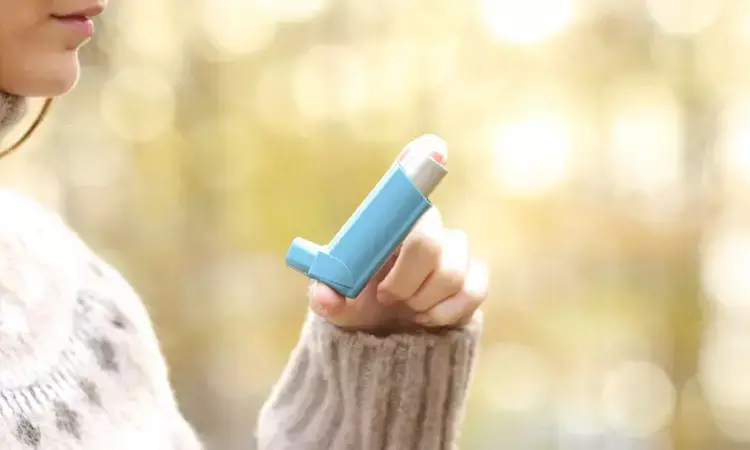- Home
- Medical news & Guidelines
- Anesthesiology
- Cardiology and CTVS
- Critical Care
- Dentistry
- Dermatology
- Diabetes and Endocrinology
- ENT
- Gastroenterology
- Medicine
- Nephrology
- Neurology
- Obstretics-Gynaecology
- Oncology
- Ophthalmology
- Orthopaedics
- Pediatrics-Neonatology
- Psychiatry
- Pulmonology
- Radiology
- Surgery
- Urology
- Laboratory Medicine
- Diet
- Nursing
- Paramedical
- Physiotherapy
- Health news
- Fact Check
- Bone Health Fact Check
- Brain Health Fact Check
- Cancer Related Fact Check
- Child Care Fact Check
- Dental and oral health fact check
- Diabetes and metabolic health fact check
- Diet and Nutrition Fact Check
- Eye and ENT Care Fact Check
- Fitness fact check
- Gut health fact check
- Heart health fact check
- Kidney health fact check
- Medical education fact check
- Men's health fact check
- Respiratory fact check
- Skin and hair care fact check
- Vaccine and Immunization fact check
- Women's health fact check
- AYUSH
- State News
- Andaman and Nicobar Islands
- Andhra Pradesh
- Arunachal Pradesh
- Assam
- Bihar
- Chandigarh
- Chattisgarh
- Dadra and Nagar Haveli
- Daman and Diu
- Delhi
- Goa
- Gujarat
- Haryana
- Himachal Pradesh
- Jammu & Kashmir
- Jharkhand
- Karnataka
- Kerala
- Ladakh
- Lakshadweep
- Madhya Pradesh
- Maharashtra
- Manipur
- Meghalaya
- Mizoram
- Nagaland
- Odisha
- Puducherry
- Punjab
- Rajasthan
- Sikkim
- Tamil Nadu
- Telangana
- Tripura
- Uttar Pradesh
- Uttrakhand
- West Bengal
- Medical Education
- Industry
Financial Incentives Boost inhaler adherence among kids with Asthma: JAMA

A randomized trial found that financial incentives increased preventive inhaler medication adherence amasthmatic children, particularly in a predominantly non-Hispanic Black and lower-income population. However, adherence dropped after the incentives stopped, and the intervention did not improve clinical outcomes.
Differential adherence to efficacious preventive medications is one potentially modifiable driver of racial disparities in childhood asthma outcomes. A study was done to determine the effect of a financial incentive-enhanced intervention on adherence to inhaled asthma preventive medication in a high-risk, predominantly racially minoritized cohort of children with asthma.
This was a randomized clinical trial conducted from September 2019 through June 2022 at a large mid–Atlantic pediatric health system in the US. Children were eligible if they were between 5 and 12 years old, prescribed a preventive inhaler for daily use, and had at least 2 asthma exacerbations requiring systemic steroids in the preceding year. Data were analyzed from December 2022 to December 2024. Inhaled medication use was monitored using electronic inhaler sensors over a 7-month period. Families who completed a 1-month run-in interval were randomized to 1 of 3 arms for a 3-month experiment interval: (1) daily text message medication reminders, weekly adherence feedback, and gain-framed, financial incentives of up to $1 per day (full intervention); (2) daily text message medication reminders and weekly adherence feedback (hybrid intervention); or (3) no reminders, feedback, or incentives (active control).
Medication adherence monitoring then continued for a 3-month observation interval, where all arms reverted to active control conditions. The primary outcome was adherence to inhaled maintenance medication during the experiment; secondary outcomes included adherence during the observation phase. The study was powered to detect a difference in average monthly adherence between the full intervention and active control condition.
Results Of the 106 children randomized, 99 had at least 1 month of monitoring data (56 male [57%] and 43 female [43%]; mean [SD] age, 8.0 [2.3] years). Most participants (81 [82%]) identified as non-Hispanic Black and demographic and clinical characteristics were similar across study arms. During the experiment interval, participants receiving the full intervention had a 15–percentage point (95% CI, 2-29 percentage points) higher inhaled maintenance medication adherence compared with participants in the active control.
There was no evidence of adherence differences in the observation interval. While a financial incentive-enhanced mobile health intervention led to higher inhaled preventive medication adherence as compared with the active control group, there was no evidence for enduring effect after the intervention components ceased, consistent with other studies that include financial incentives to encourage behavior change.
Reference:
Kenyon CC, Quarshie WO, Xiao R, et al. Tailored Adherence Incentives for Childhood Asthma Medications: A Randomized Clinical Trial. JAMA Pediatr. Published online March 17, 2025. doi:10.1001/jamapediatrics.2025.0010
Dr. Shravani Dali has completed her BDS from Pravara institute of medical sciences, loni. Following which she extensively worked in the healthcare sector for 2+ years. She has been actively involved in writing blogs in field of health and wellness. Currently she is pursuing her Masters of public health-health administration from Tata institute of social sciences. She can be contacted at editorial@medicaldialogues.in.
Dr Kamal Kant Kohli-MBBS, DTCD- a chest specialist with more than 30 years of practice and a flair for writing clinical articles, Dr Kamal Kant Kohli joined Medical Dialogues as a Chief Editor of Medical News. Besides writing articles, as an editor, he proofreads and verifies all the medical content published on Medical Dialogues including those coming from journals, studies,medical conferences,guidelines etc. Email: drkohli@medicaldialogues.in. Contact no. 011-43720751


